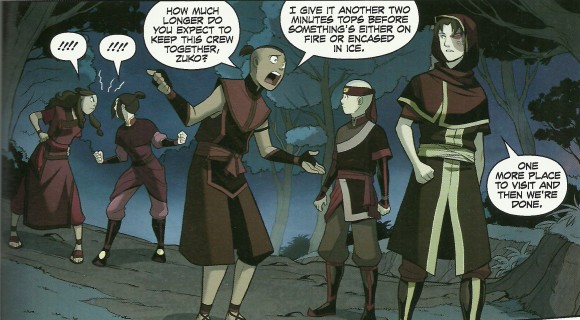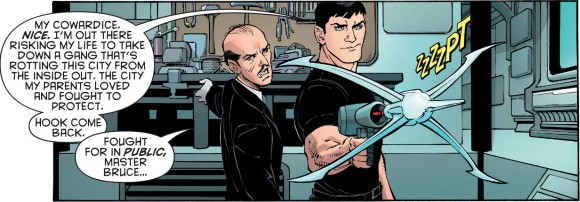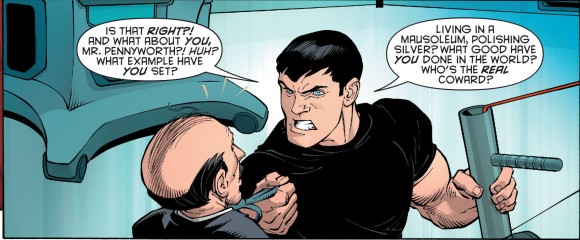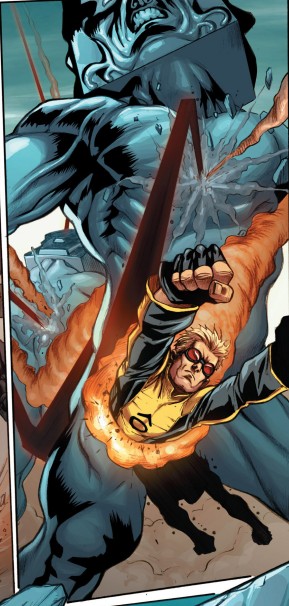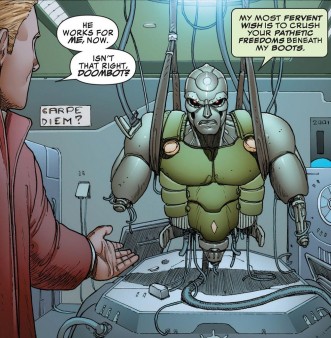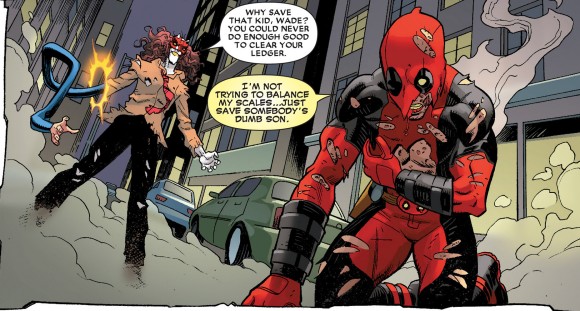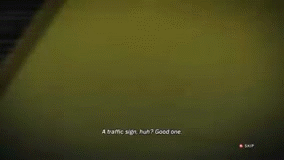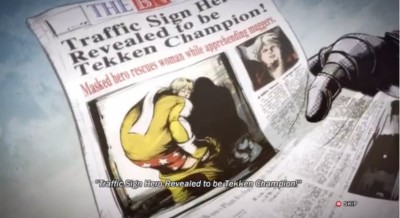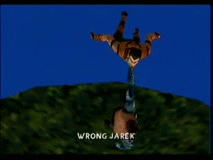
On the perception of artists in comics
July 16th, 2013 Posted by david brothersOne thing I feel really strongly about is the position of artists in comics. I talked about it last year and I’m sure I’ve tweeted about it a lot. Artists are, thanks to a wide variety of factors both intentional and incidental, often devalued in comics, especially when we’re talking mainstream fare, corporate or otherwise. I honestly, earnestly believe that the best comics happen when the writer, artist, and the rest of the creative team are on the same page and into the work and each other.
If you swap out everyone on a creative team but the writer like aftermarket car parts, then the only stable figure in the equation is the writer, then the writer will be viewed as the prime mover, the “creator” of the story. The truth is that a comic isn’t a comic until an artists puts pen to pad, and the relationship between writer and artist isn’t as simple as “This guy tells this lady what to do and she does it.”
But that’s the perception. I’ve talked about it again and again, but let me reiterate: the most common formula for a comics review is a bunch of paragraphs about what happens, followed by one paragraph about the art, followed by a conclusion. I know why it happens–cape comics in particular are about “what happens” as opposed to “how it happens” in marketing and reviewing–but I hate it. It’s aesthetically ugly, intellectually lazy, and it serves to devalue the artist. They’re always an afterthought, an “Oh by the way,” if that, and that contributes to our perception of artists.
Jack Kirby didn’t draw Stan Lee’s Fantastic Four. They created it together. The same is true of the dumbest movie tie-in comic and the greatest pop comics single issue. Collaboration is key.
I put a lot of thought into this last year in particular. I made the conscious decision to swap how I credited comics, both in headlines and normal conversation. The normal way of doing things is writer/artist, like Stan Lee/Jack Kirby. (I didn’t realize it until just now, but even the term “writer/artist” is tilted in favor of writing, not drawing.) Instead, I force myself to think for a second and type “Kirby/Lee.”
I don’t do it to suggest that the writer is less important than the artist. It’s a mental device that keeps me in mind of the facts: comics are collaborative, and each link in the chain is vital. You can’t talk about comics without talking about art. You can’t make comics without art. Going from writer/artist to artist/writer forces me to reconsider how I talk about comics and who I credit for what.
I used to empathize with reviewers who did the one short paragraph-about-art thing. It’s hard to talk about art if you aren’t an artist, the story’s really what interests you, you lack the confidence to speak as authoritatively on art as you would on story. Nowadays, though, I think they’re scared, or maybe just too soft to do the legwork required to talk about comics intelligently.
I’m a dummy. I dropped out of college, turned away from art school in high school, and I couldn’t tell you the difference an inker using a brush and a pen if I tried. (I would hazard a guess, though.) But I can look at art, figure out what it means to me or what it brings to mind, and express that in a critical manner.
If you aren’t doing that, you ain’t doing your job. And if you don’t know, figure it out. Ask someone, think about it really hard (I like this one), or just mull it over until it coalesces in your head. You can do it. I talk about my dumb emotions until I’m comfortable enough to talk about the art itself, as opposed to my reaction to it, though those are often tend to merge into the same thing once you start talking about them.
Darryl Ayo‘s review of Sam Alden’s Backyard (print) reignited these thoughts for me. It’s a review-via-numbered list, a technique I’ve enjoyed and used myself, but I haven’t seen it in a while. Darryl snaps from observations about the atmosphere, tone, characterization, art, and back again because he understands a fundamental truth of comics: the art is the story.
I enjoyed this piece from Andy Khouri on valuing and devaluing artists in comics, too. He lays out a lot of plain truths I agree with 2013%. I like this especially: “Story is art. Style is substance. A comic is not a comic until it is drawn.”
Gospel truth.
Dennis Culver, artist and co-creator of Edison Rex (print, digital) with writer Chris Roberson, is a friend of mine. We talk a lot about comics, mainly because he makes them, I read them, and we both have strong opinions on the subject. I’m coming from the perspective of a critic, someone who takes forever to read good comics and wants comics to be better. He’s coming from the perspective of an artist, someone who wants and deserves to feel valued in the comics conversation and puts in a massive amount of work to get a comic done.
We agree on a lot of things, but often in different ways. He collected a bunch of his tweets on the subject and reposted them on tumblr. I asked if I could repost them here and he said sure, so here we are:
You’re not writing about comics if you’re not talking/thinking about the art.
I think the trap a lot of critics fall into is giving sole credit for the story visuals to the writer.
And if any credit is given to the artist it’s usually for style. Ie Cartoony, realistic etc.
But if you give 6 different artists a panel description you will get 6 different images.
And each of those images can make you feel different things. Things the writer may not have initially intended.
That synergy is the magic of comics and it’s why artists are really co-writers.
The production line method of making comics is just an imperfect emulation of a single cartoonist.
Every part of the comics production line requires choices that affect the storytelling.
While the comics production line is great for speed, it’s created a lot of false boundaries that when strictly adhered to make bad comics
If you’re not directly communicating with your collaborators then you’re not collaborating. You’re playing telephone.
Don’t have time to read many comics but 2 books I look forward to the most are Daredevil by Waid and Samnee and Hawkeye by Fraction and Aja
Neither book singles out credit for writing or art and in the case of Daredevil, Waid and Samnee are just credited as “Storytellers.”
Both go beyond the normal production line collaboration and I think that is why the books are of such high quality.
I want to see more of this! I think it makes for better comics. And it shows that both writers value their artists as storytellers.
Because frankly when you’re an artist it’s easy to feel undervalued as a storyteller in this industry.
When a review only focuses on and gives all story credit to the writer while only mentioning the artist in passing if at all. I feel undervalued as a storyteller.
When a publisher puts out a press release that only talks about the writer, I feel undervalued as a storyteller.
When a publisher holds a story conference and only invites their writers, i feel undervalued as a storyteller.
It’s certainly not the writer’s fault but hey if you’re doing an interview about a book and the art is not being talked about. Bring it up.
The only way reviewers and the comics press can figure out how to talk about art is by talking about art.
When a writer refers to “his artists” I feel undervalued as a storyteller.
In comics I do think drawing is co-writing but I will also add in the best instances writers are co-directing the art with the artist
I have an excellent collaboration with @chris_roberson on Edison Rex and if you could see out process, I think you’d be hard pressed to say where the writing ends and the art begins. Ask Chris, I am OPINIONATED about the story but Chris is the same about page layout and design. And I think that makes for a better comic.
It’s frustrating to read a review or tweet or whatever that glosses over my role as a storyteller.
You learn to do things by doing them. I’d rather see a reviewer clumsily talk about art than not at all.
I use undervalued specifically because this industry is built on undervaluing its creators. Creators that feel valued make better comics!
Here I was talking with a reviewer:
The art IS the story. Even if you don’t care for the style or don’t think it’s dynamicThe presentation by the artist of the images in sequence is how the story is being told. The art IS the story.
If you get rid of the art and are only left with the balloons, you will have no idea what’s going on. Comics IS art
When a reviewer only credits a writer with the story it is inarguably wrong. That’s just not how the process works.
Chris and I are credited for each others ideas in Edison Rex reviews all the time. Often we’re not sure who did what. If we don’t know how can you?
I want to have this conversation. I want to be better. I want reviewers, fans, and companies to listen and consider how they view comics and the role of each creator. The only way I know how to do that is to talk about it whenever I can and pray people pay attention.



